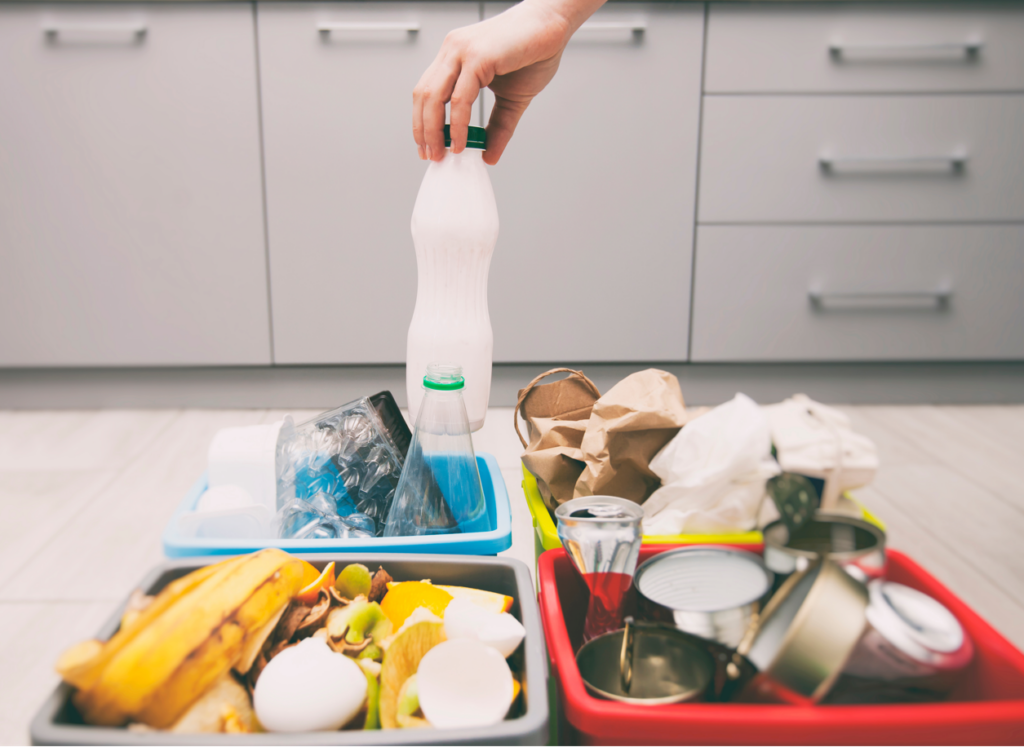Recycling and good waste management are becoming far more recognised and well known, with all UK councils offering recycling collections and more supermarkets and businesses are also offering other recycling schemes. Whilst many of us claim to have a good understanding of recycling methods, there are some common mistakes that happen frequently when it comes to recycling. These although often seen as ‘innocent’ mistakes, can cause very damaging issues, and often cancel out the good that recycling can do to our planet. Here are some common waste management mistakes, we should all avoid.
Black plastic is unrecyclable.

Whilst more and more plastics are now being manufactured with recyclability in mind, black plastics remain unrecyclable – despite the common misconception that they are. When sent to recycling centres, black plastics such as ready meal containers, coffee lids, plastic bottles or trays, cause issues during the reprocessing part of recycling. Black plastics are often hard to detect by the waste sorting systems, instead, they will contaminate a batch of recycling when left in the wrong segment. When disposing of black plastic waste, we should try to reduce this waste from the start, before considering re-use, and if that is not applicable, the end of life should be in the general waste bin.
Sweets and crisp wrappers and film are also unrecyclable kerbside
A vast majority of the food we consume comes in a form of a wrapper, not only is this excellent for hygiene and contamination reasons, but it also helps greatly increase the life span of the product, thus reducing food waste. However, the issue with this is often this packaging, such as crisp packets, plastic film and sweet wrappers, can not be easily recycled.
Although local authorities offer plastic waste collections, these types of plastics are very often deemed unrecyclable, and if mixed in with recyclable items, they hinder the entire batch and cause issues during the recycling processes. In the past, these items have only one destination – the general waste bin. Now, however, more supermarkets are accepting these types of plastic waste, known as ‘flexible plastic / flexible packaging’. They have intelligent and highly effective reprocessing and recycling machinery, that can now give these formerly ‘unrecyclable’ materials a second life. It is important that you only dispose of these flexible plastics in these specialist waste receptacles and not into your household recycling.
The material must be clean before recycling
Once we have finished with our item, we choose where it gets disposed of, whether this is into the recycling or into the general waste bin. The best option is always to recycle the product (only if it is recyclable & accepted), but one factor that instantly affects its recyclability, is the cleanliness of the material. It is very important all items that are recycled are clean and free from food waste or residue. A dirty container placed into the recycling will contaminate the batch of recycling and be unable to be reprocessed, thus leaving the item pointlessly recycled.
Whether you are recycling a drinks bottle, or food tray – make sure it is washed removing any possible contaminants.
Separate the different materials

Many products we use daily, have a mixture of material components, often many of these are all recyclable – however often they must be recycled separately – if mixed this causes contamination and sorting issues, putting a halt on the recycling and reprocessing. For example, food packaging can often contain a plastic tray, nestled in a cardboard sleeve – both items are recyclable, but some council waste collections will only accept them separately. It is important to firstly understand your household collection strategies, in order to understand where each material needs to be placed.
It is also important to remove any unrecyclable items, from recyclable material, for example removing packaging tape or stickers from cardboard boxes, or unrecyclable film from plastic bottles.
Recycling is a wonderful process, which helps support a circular economy, to help create a cleaner more economical planet, but if we do recycle, we must ensure we are doing it correctly!
Read our blog for more tips, or head to the Let’s Recycle website.